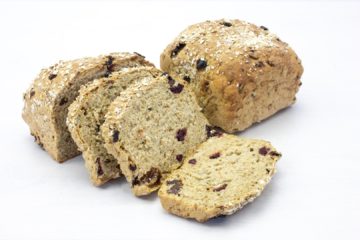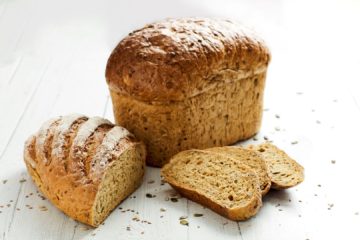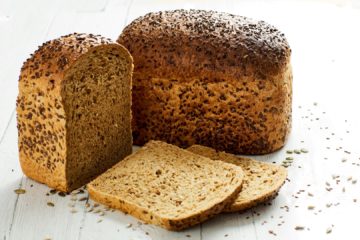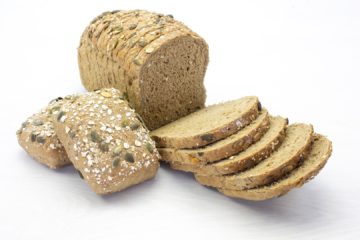- Place all of the ingredients into a spiral mixing bowl.
- Mix for 3 minutes on slow speed and 7 minutes on fast speed, until fully developed.
- The dough temperature should be 24-26℃.
- Leave to rest for 3 minutes.
- Scale at 480/900g.
- Prove for 50 minutes at 36℃, 88% relative humidity.
- Bake at 230℃ for 25 minutes, with 6 seconds of steam.
Yield: 32 small / 17 large loaves
Full nutrients and claims:
Source of Protein
High in Fibre
Wheat bran fibre contributes to an acceleration of intestinal transit.
High in Chloride
Chloride contributes to normal digestion by production of hydrochloric acid in the stomach.
High in Phosphorus
Phosphorus contributes to normal energy-yielding metabolism.
Phosphorus contributes to normal function of cell membranes.
Phosphorus contributes to the maintenance of normal bones.
Phosphorus contributes to the maintenance of normal teeth.
High in Manganese
Manganese contributes to normal energy-yielding metabolism.
Manganese contributes to the maintenance of normal bones.
Manganese contributes to the normal formation of connective tissue.
Manganese contributes to the protection of cells from oxidative stress.
Source of Folate
Folate contributes to maternal tissue growth during pregnancy.
Folate contributes to normal amino acid synthesis.
Folate contributes to normal blood formation.
Folate contributes to normal homocysteine metabolism.
Folate contributes to normal psychological function.
Folate contributes to the normal function of the immune system.
Folate contributes to the reduction of tiredness and fatigue.
Folate has a role in the process of cell division.
Source of Iron
Iron contributes to normal cognitive development of children.
Iron contributes to normal cognitive function.
Iron contributes to normal energy-yielding metabolism.
Iron contributes to normal formation of red blood cells and haemoglobin.
Iron contributes to normal oxygen transport in the body.
Iron contributes to the normal function of the immune system.
Iron contributes to the reduction of tiredness and fatigue.
Iron has a role in the process of cell division.
Source of Thiamin
Thiamin contributes to normal energy-yielding metabolism.
Thiamin contributes to normal functioning of the nervous system.
Thiamin contributes to normal psychological function.
Thiamin contributes to the normal function of the heart.
Source of Copper
Copper contributes to maintenance of normal connective tissues.
Copper contributes to normal energy-yielding metabolism.
Copper contributes to normal functioning of the nervous system.
Copper contributes to normal hair pigmentation.
Copper contributes to normal iron transport in the body.
Copper contributes to normal skin pigmentation.
Copper contributes to the normal function of the immune system.
Copper contributes to the protection of cells from oxidative stress.
Source of Magnesium
Magnesium contributes to a reduction of tiredness and fatigue.
Magnesium contributes to electrolyte balance.
Magnesium contributes to normal energy-yielding metabolism.
Magnesium contributes to normal functioning of the nervous system.
Magnesium contributes to normal muscle function.
Magnesium contributes to normal protein synthesis.
Magnesium contributes to normal psychological function.
Magnesium contributes to the maintenance of normal bones.
Magnesium contributes to the maintenance of normal teeth.
Magnesium has a role in the process of cell division.
Source of Niacin
Niacin contributes to normal energy-yielding metabolism.
Niacin contributes to normal functioning of the nervous system.
Niacin contributes to normal psychological function.
Niacin contributes to the maintenance of normal mucous membranes.
Niacin contributes to the maintenance of normal skin.
Niacin contributes to the reduction of tiredness and fatigue.
Source of Vitamin B6
Vitamin B6 contributes to normal cysteine synthesis.
Vitamin B6 contributes to normal energy-yielding metabolism.
Vitamin B6 contributes to normal functioning of the nervous system.
Vitamin B6 contributes to normal homocysteine metabolism.
Vitamin B6 contributes to normal protein and glycogen metabolism.
Vitamin B6 contributes to normal psychological function.
Vitamin B6 contributes to normal red blood cell formation.
Vitamin B6 contributes to the normal function of the immune system.
Vitamin B6 contributes to the reduction of tiredness and fatigue.
Vitamin B6 contributes to the regulation of hormonal activity.
All nutrients need to be eaten regularly, as part of a healthy lifestyle and balanced diet.






















